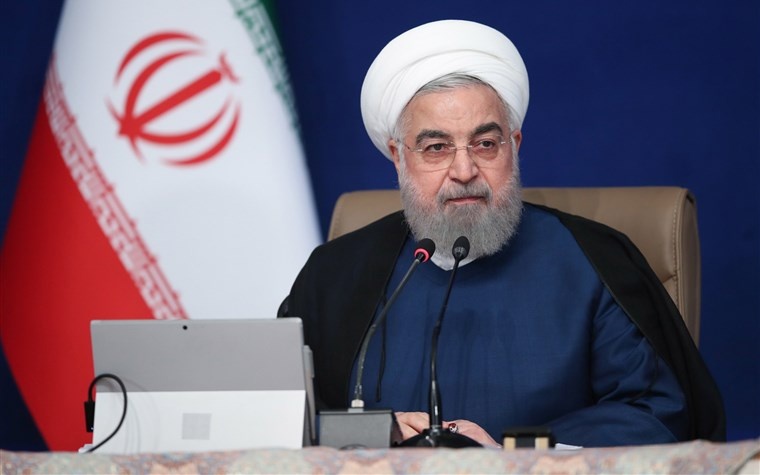Iranian President Hassan Rouhani speaks at a press conference, Tehran, December 14, 2020 (Anadolu)
In a gesture to the incoming Biden Administration, Iran’s President Hassan Rouhani has said there are no preconditions for a US return to the 2015 nuclear deal between Tehran and the 5+1 Powers (US, UK, China, Russia, France, and Germany).
In a press conference on Monday, Rouhani hit back at Iranian hardliners who have opposed a quick American re-entry to the agreement, from which the Trump Administration withdrew in May 2018 and then imposed comprehensive sanctions on Tehran six months later.
The President said that Washington could be back in the deal “within an hour”: “Putting preconditions for [the US] on a return to the JCPOA [Joint Comprehensive Plan of Action] will mean continuation of the sanctions for another five years.”
The US measures have contributed to a fall in Iranian oil exports of up to 95% since April 2018. Tehran’s non-oil trade with its biggest customers has also dropped: 60% with China and the Gulf States, 75% with Turkey, and up to 95% with India, Japan, and South Korea.
Pressing his case against hardline critics, Rouhani chided, “Trump and some inside Iran wanted to destroy the JCPOA, but our government did not let this happen….We preserved the deal….The government will not let some to delay the end of sanctions, and we’ll stand against them.”
Using last month’s assassination of top nuclear scientist Mohsen Fakhrizadeh, the Iranian Parliament has tried to command the Government to suspend more provisions of the deal if the Biden Administration does not end US sanctions by March.
But the Government has objected to its hands being tied, for example, over a return to the pre-2015 level of 20% enriched uranium, which can potentially be further enhanced to a military grade of more than 90%.
Rouhani summarized on Monday, “The government does not consider the law by Parliament as useful….We’ll write the executive regulations in the framework of our interpretation” of the law, which is a law that removes sanctions and doesn’t make them last longer.”
Defiance Alongside A Renewed Deal
While encouraging US re-entry, Rouhani linked Iran’s return to the deal’s provisions with the lifting of the American sanctions: “If the 5+1 Powers fulfil all their commitments tomorrow, we’ll also fulfil ours.”
Following the line of the Supreme Leader, he rejected any negotiations over Iran’s missile program. And he echoed Ayatollah Khamenei’s presentation of “an all-out economic war”, adding, “The President is the commander.”
Defying Iran’s economic crisis, he claimed:
We will sell 2.3 million barrels [per day] of oil whether sanctions are lifted or not. We will sell it outside or at home. This will definitely happen…If sanctions are lifted, our oil export will be 2.8 or 2.9 million barrels.
Iran’s oil sales, which were about 2.5 million bpd in April 2018, sank to only a few hundred thousand under the weight of US sanctions. Shipping analysts calculated that Iran exported about 1.2 million bpd in September, and almost as much in October. However, much of this has been in barter with countries such as Venezuela and in a credit line to Syria, with claims of illicit shipments to China to evade the American sanctions.
Rouhani said at a Cabinet meeting last week that the Government’s budget for 2021-22 is based on sales of 2.3 million bpd.
See also Rouhani Bases Government Budget on Huge Surge in Iran’s Oil Sales

